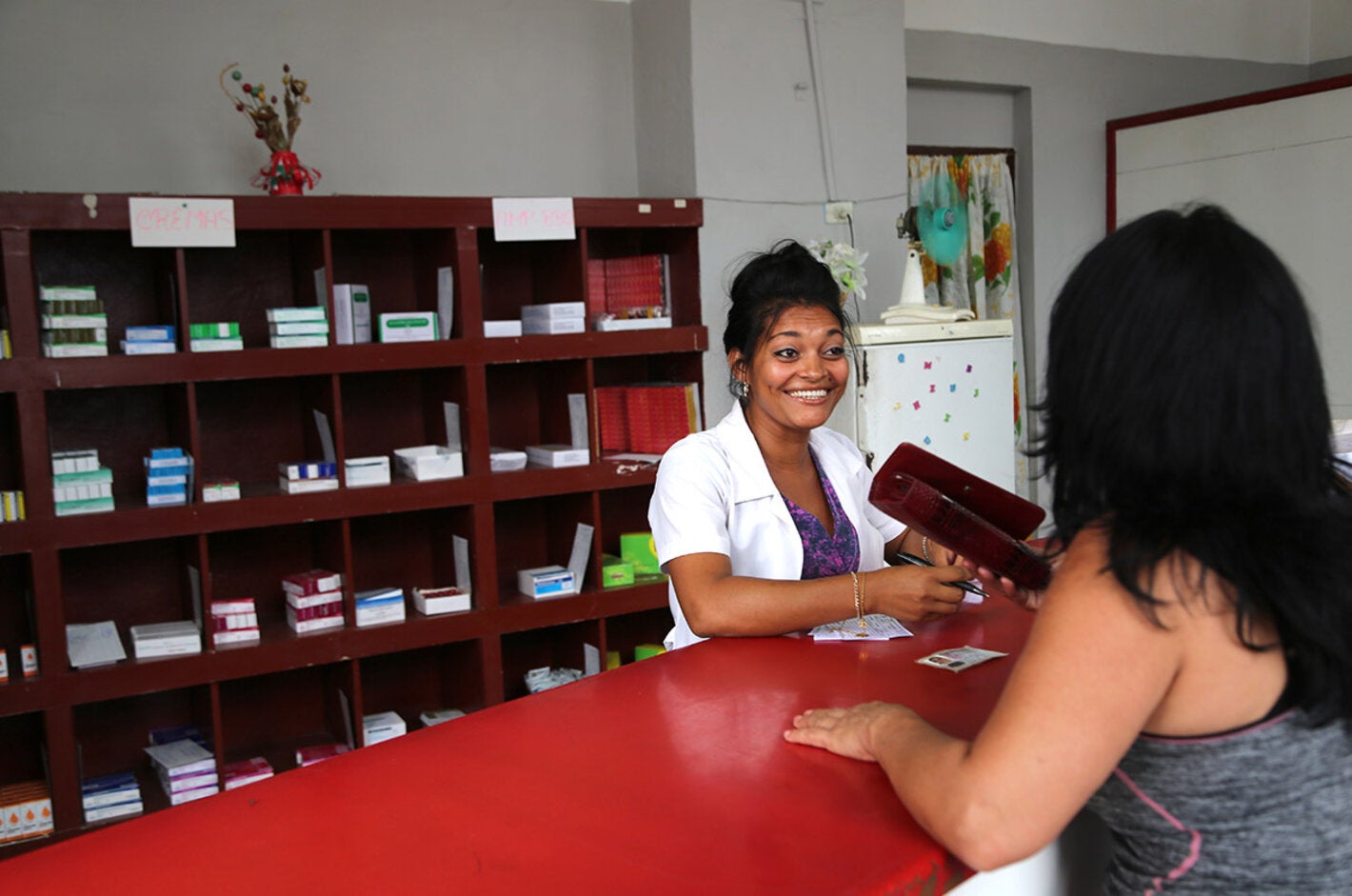Washington, DC. August 2020. Cuba's National Health System (Sistema Nacional de Salud, SNS) is universal, free, public, decentralized, and focused on disease prevention and the first level of care. There is no private health care sector in the country.
Medical prescriptions have always been required for the sale of antibiotics, but enforcement of prescriptions only began in 1991. That year, the first National Drug Program established the implementation of measures for the enforcement and controlling of prescriptions, including: identifying prescribers through customized stamps for each practitioner; controlling the provision of prescription pads to doctors, with different amounts distributed according to the level of care; regulating the prescription of certain products; limiting prescriptions to a single drug; and determining whether prescriptions are correct and legible, among other actions. These enforcement measures are updated in each version of the National Drug Program.
Prescription sale of antimicrobials
Antimicrobials account for 16.5% of all drugs in the country's essential list, which totaled 757 in 2019. The Center for the State Control of Medicines, Equipment, and Medical Devices (Centro para el Control Estatal de Medicamentos, Equipos y Dispositivos Médicos, CECMED), the Cuban regulatory authority, grants health registration and marketing authorization for drugs, including antimicrobials, in accordance with international standards and guidelines to ensure product quality, safety, and efficacy.
Antimicrobials are available at different distribution levels, according to treatment and strategic use. They are sold in community pharmacies by prescription (doctors and stomatologists). The prescription form 53-05-04 is used, the diagnosis that prompted the prescription must be included, and the prescription is valid for seven days. In some cases, the amount dispensed in each prescription is regulated. The prescription is based on the physician’s decision, based on treatment needs.
General Regulations and the Standards and Procedures Manual for Community Pharmacies
Pharmaceutical services fall under the General Regulations and are guided by the Standards and Procedures Manual for Community Pharmacies. These documents are methodological tools for daily activities in these pharmacies. To dispense any drug, including antimicrobials, the Regulations state that the prescription must be checked for all necessary information and contain legible handwriting. The prescription must also be signed and stamped by the doctor and the institution.
As part of economic control measures, for the drug to be dispensed, the prescription must be attached to the proof of sale, on which the name and amount of the drug must be clearly noted. All appropriate information must be recorded on the balance sheets for each product, checking for discrepancies in existing stocks of each drug, among other actions.
If an antimicrobial prescription is filled out incorrectly and the diagnosis is missing, the incidence is recorded in a pharmacy log to be analyzed by the appropriate drug treatment committee.
All these measures apply to the sale of antimicrobials nationally. These drugs are not sold without a prescription anywhere in the country.
In August 2018, CECMED participated in the first face-to-face meeting organized by the Pan American Health Organization on enforcement procedures of the sale of antibiotics in the Region, held in Colombia. During the meeting, country-specific plans of action were developed, considering factors such as: political support, coordination between actors, review/update of regulations, inspections, sanctions, financing, and monitoring, among other topics.
Cuba confirms that political will exists to support this issue, which is included in the National Plan for the Containment of Antimicrobial Resistance, led by the Ministry of Public Health. In February 2019, a workshop on integrated surveillance of antimicrobial resistance, organized by the Institute of Tropical Medicine "Pedro Kourí" (IPK), was held with the participation of people from all related areas. CECMED has held activities to raise awareness of the issue among healthcare professionals.
For the containment of antimicrobial resistance, Cuba’s regulatory authority works jointly with the Ministry of Health's Directorate of Medicines and Technology and the IPK's national microbiology reference laboratory. It also works with focal points, healthcare specialists (epidemiologists, pharmaco-epidemiologists, microbiologists, and pharmacists), and the national biopharmaceutical industry to promote the rational use of antimicrobials.
Currently, a document (guidelines/checklist for pharmacy inspections) is being developed for use during ministerial visits to the network of community pharmacies and during market monitoring by the National Regulatory Authority.
Authors hold sole responsibility for the views expressed in their texts, which may not necessarily reflect the opinion or policy of the Pan American Health Organization. The mention of specific companies or certain manufacturers' products does not imply that they are endorsed or recommended in preference to other ones of a similar nature.
Note: Article subscribed by Ismary Alfonso Orta, Pharmacovigilance Specialist and coordinator of the Antimicrobials project at the Center for State Control of Medicines, Equipment and Medical Devices, to PAHO/WHO for the Bulletin on Rational Use for of antimicrobials for the containment of the resistance.
- Ministry of Public Health. Ley de la Salud Pública y su Reglamento. Ley 41 de la Salud Pública. Havana, 1988.
- Pérez Peña J, Cires M, Freijoso E, Lara Bastanzuri MA, Cruz MA, Furones JA, et al. Modelo Cubano de la Red Nacional de Farmacoepidemiología. Havana; Editorial Académica, 2008.
- Ministry of Public Health. Programa Nacional de Medicamentos VI version (National Drug Program, version VI). Havana; 2012.
- Directorate of Drugs and Technology. Cuadro Básico de medicamentos y productos naturales 2019. Havana: Minsap; 2019.
- Ministry of Public Health. Manual de Normas y Procedimientos Farmacia Comunitaria. Havana; 2005.
- GACETA OFICIAL. Reglamento General de Farmacias Comunitarias. GOC 2016-445-O21, SALUD PÚBLICA. Havana; 2016.
- CECMED. List of activities, 2018.

